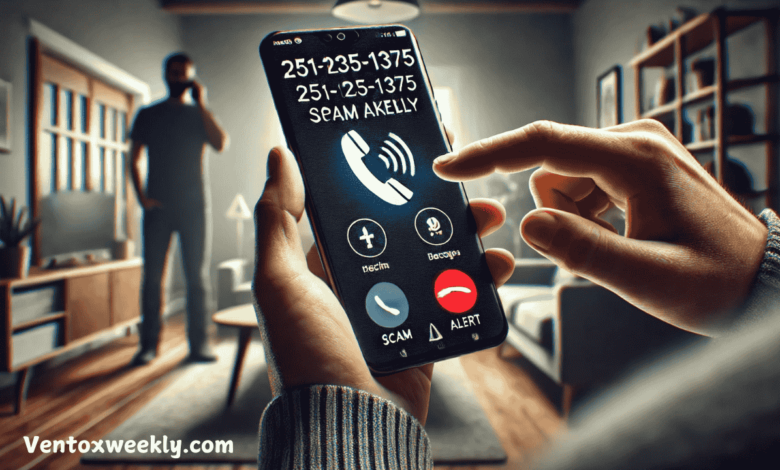Beware of 251-235-1375: Understanding Robocalls, Scams, and How to Protect Yourself.

Unsolicited phone calls from numbers like 251-235-1375 are becoming increasingly common, often bringing unwanted interruptions and posing potential risks. As many were flagged as robocalls, several users have reported this number for suspected scam activities. In this article, we’ll explore the origins of robocalling, how to identify suspicious calls from numbers like 251-235-1375, the tactics commonly used in scams and practical strategies for blocking and reporting unwanted calls. With this information, you can better safeguard your personal information and avoid scams.
What is a Robocall?
A robocall is an automated phone call that uses a computerized autodialer to deliver a prerecorded message. While some robocalls are legitimate—such as those from schools or healthcare providers—others aim to deceive, harass, or scam. Scammers use robocalls because they can reach a large number of people quickly and at a low cost. Numbers like 251-235-1375 are often associated with these calls, as they get numerous recipients within seconds.
Why Do Scammers Use Robocalls?
Scammers rely on robocalls for several reasons:
- Broad Reach: Robocall technology allows scammers to reach thousands of numbers quickly.
- Cost-Effectiveness: Automated calls are cheaper than hiring individuals to make calls.
- Anonymity: Robocallers can easily mask their real numbers or use number spoofing, meaning that calls may appear as local or familiar numbers on caller ID, even if they’re from a scammer abroad.
Common Types of Robocall Scams from Numbers Like 251-235-1375
Understanding common robocall tactics helps in identifying scams. The following are popular methods scammers use to deceive individuals:
Extended Car Warranty Scams
One of the most frequent robocall scams, the extended car warranty scam, is designed to trick recipients into purchasing a fake or unnecessary warranty. Callers may imply they are from a reputable car manufacturer and state that a car warranty is about to expire. They might press for an immediate payment to extend the warranty and ask for sensitive information like credit card details or your vehicle identification number.
Debt Relief or Loan Forgiveness Offers
Debt relief scams often promise to lower your credit card interest rates or forgive student loans in exchange for a fee. Scammers might claim to be from a well-known financial institution or even a government agency, and they use persuasive language to lure victims into sharing their financial details.
Prize and Lottery Scams
In prize or lottery scams, callers inform recipients that they’ve “won” a prize or lottery, but to claim it, they must first pay taxes or registration fees. After the payment is made, victims find out there is no prize. Numbers like 251-235-1375 are sometimes reported for this kind of scam, especially when offering fake travel packages or gifts.
Charity Scams
Charity scams prey on emotions, particularly during times of crisis or natural disaster. A caller might ask for a donation to support a cause like disaster relief or aid for veterans, but the funds often go directly to the scammer. Robocallers use this common technique, and they can be compelling.
Fake Tech Support Calls
Tech support scams involve callers posing as representatives from reputable tech companies. They often claim an issue with your computer or device and request remote access to “fix” the problem. They may install malicious software or charge fees for unnecessary services.
How to Recognize Scam Calls from Numbers like 251-235-1375
Scam calls often follow specific patterns or behaviors that can alert you to their fraudulent nature:
- Immediate Pressure to Act: Scammers frequently urge you to act quickly, often using fear tactics to prevent you from thinking critically or verifying your claims.
- Requests for Personal Information: Legitimate businesses will not ask for sensitive data such as Social Security numbers, bank account information, or credit card details over the phone.
- Vague or Generic Greetings: Many robocalls start with a recorded message or a generic greeting, such as “Hello, valued customer.”
- Caller ID Spoofing: Robocallers can mask their number, making it appear that the call is from a local or familiar number, such as 251-235-1375, to increase your chances of picking up.
Why 251-235-1375 is Flagged as a Suspicious Number
Reports from consumer protection websites like RoboKiller and Nomorobo frequently cite 251-235-1375 as associated with robocalls and potential scams. Many individuals report receiving calls from this number with prerecorded messages about medical benefits, car warranties, and more. These calls are often unsolicited and can be blocked by various call protection services.
According to the FTC, robocalls commonly use spoofed numbers like this to evade detection. Cycling through various numbers makes it harder for recipients to identify and block all scam calls.
How to Protect Yourself from Robocalls and Scams
The following steps can help you protect yourself from robocalls and prevent falling victim to potential scams:
Use Call-Blocking Services
Services like Nomorobo and RoboKiller are designed to filter and block suspected robocall numbers, including 251-235-1375. These apps use crowd-sourced data to identify and prevent spam calls before they reach you.
Register on the National Do Not Call Registry
The US National Do Not Call Registry allows you to add your number to a list of individuals who do not wish to receive sales calls. While it won’t stop all robocalls, as many scammers disregard the registry, it can reduce the number of legitimate telemarketing calls.
Enable Caller ID and Call Screening
Modern smartphones allow you to screen calls and view the caller’s information before answering. Avoid picking up calls from unknown or suspicious numbers, and consider using your phone’s call-blocking feature.
Report Scam Calls
If you receive a robocall from 251-235-1375 or any other suspicious number, report it to the Federal Trade Commission (FTC). Reporting helps regulatory authorities track down and address robocalls, reducing the likelihood of them targeting other individuals.
Avoid Sharing Personal Information
Never share personal, financial, or sensitive information over the phone unless you know the caller’s identity. Legitimate businesses will not ask for details like Social Security numbers or credit card information through unsolicited calls.
Hang Up Immediately
If you suspect a scam, hang up immediately. Do not engage, press any buttons, or follow prompts that claim to remove you from a call list, as this may increase the number of robocalls you receive.
Steps to Take if A Robocaller has scammed you
If you’ve fallen victim to a robocall scam, taking the following steps can help mitigate potential damage:
- Contact Your Bank or Credit Card Provider: If you share financial details, contact your bank to monitor your accounts for suspicious activity.
- Change Your Passwords: If the scam involves online accounts, change your passwords to secure your information.
- Monitor Your Credit Report: Regularly check your credit report for unfamiliar activities. The FTC provides information on how to dispute fraudulent charges.
- Report the Incident to the FTC: By reporting the scam, you’re contributing to the fight against robocalls and helping protect others.
Conclusion
Phone numbers like 251-235-1375 are often associated with unsolicited robocalls and scams, posing risks to your privacy and financial security. Recognizing scam tactics and using available protective measures, like call-blocking services and reporting scams, can significantly reduce your chances of falling victim to such calls. Staying informed and vigilant is critical—by understanding common robocall scams and knowing how to respond, you can keep yourself safe and help curtail the rise of these unwanted calls.



